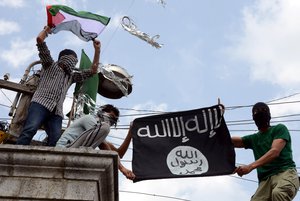- published: 15 Apr 2009
- views: 35586
-
remove the playlistChongzhen
-
remove the playlistChongzhen Emperor Interviews
- remove the playlistChongzhen
- remove the playlistChongzhen Emperor Interviews
- published: 22 Oct 2015
- views: 84721
- published: 02 Nov 2015
- views: 1098
- published: 23 Aug 2011
- views: 1594
- published: 27 Aug 2015
- views: 65
- published: 05 Oct 2013
- views: 2621

The Chongzhen Emperor (simplified Chinese: 崇祯; traditional Chinese: 崇禎; pinyin: Chóngzhēn; Wade-Giles: Ch'ung-chen/old spelling: Ch'ung-cheng) (February 6, 1611 - April 25, 1644) was the 16th and last emperor of the Ming Dynasty in China. He reigned from 1627 to 1644, under an era name that means "honorable and auspicious".
Born Zhu Youjian (朱由檢), Chongzhen was the fifth son of Zhu Changluo, the Taichang Emperor. His mother Lady Liu was a humble concubine of the Taichang Emperor. When he was four years old, she was killed by Zhu Changluo in his anger and anxiety, reason kept unknown. She was buried secretly, and Zhu Youjian was adopted by Consort Kang, some years later transferred to Consort Zhuang, as Consort Kang gave birth to another princess and adopted Zhu Youxiao as well.
As such, he grew up in a relatively lonely but quiet environment, since most of the younger sons were left out of the power struggle that their elder brother the Tianqi Emperor had to endure. Chongzhen succeeded his brother to the throne at age 17[clarification needed] and immediately eliminated the eunuch Wei Zhongxian and Madame Ke, who had become de facto rulers of the empire.
This article is licensed under the Creative Commons Attribution-ShareAlike 3.0 Unported License, which means that you can copy and modify it as long as the entire work (including additions) remains under this license.
- Loading...

-
 9:00
9:00The story of Chinese Emperor (长河东逝MV)【明朝/崇祯、永历】
The story of Chinese Emperor (长河东逝MV)【明朝/崇祯、永历】The story of Chinese Emperor (长河东逝MV)【明朝/崇祯、永历】
Here is an affecting MV about Emperor Chongzhen & Emperor Yongli,Ming Dynasty(1368-1644 AD)in China. 对明朝历史感兴趣的,推荐《明朝那些事儿》: http://blog.sina.com.cn/s/blog_49861fd5010003ii.html 思宗朱由检(1610-1644) 年号崇祯,1627年即位,在位17年。即位后,诛杀魏忠贤,颇为勤政,勉力振作,无奈积重难反,各地农民起义爆发,北方皇太极不断骚扰入侵。1644年李自成攻入北京,崇祯帝在景山自缢身亡。时年35岁。死前于袍服上大书勿伤百姓一人。 永历是南明政权的年号,永历皇帝朱由榔是朱明王朝末代皇帝,是当时全国以反清复明为目标的各武装奉为正朔的统帅。永历十六年四月十五日朱由榔被吴三桂绞杀于昆明。他的败亡标志着朱明王朝灭亡,也标志着汉民族最后一个封建王朝终结。我们只能看着落后屠戮了先进,野蛮吞噬了文明,中华民族从此由盛至衰。 MV 作者:蔚宗。 -
 109:06
109:06Fall of Ming 2013 HD - English subtitles
Fall of Ming 2013 HD - English subtitlesFall of Ming 2013 HD - English subtitles
Late Ming Dynasty, the rebellion led by Li Zicheng was besieging Kaifeng and winning. Emperor Chongzhen gave general Sun Chuanting his elitist force to rescue Kaifeng and stop the rebellion. However, while preparing for battle, imperial army had an epidemic. Fortunately, doctor Wu Youke, who had some knowledge about this epidemic, tried his best to stop it. This is a nice movie with wonderful acting by Leon Dai (Sun Chuanting) -
 56:57
56:57Liao Chongzhen - A bright candle of humanity
Liao Chongzhen - A bright candle of humanityLiao Chongzhen - A bright candle of humanity
Liao Chongzhen dedicated his life to the service of the Bahá'í Faith and humanity. He translated 'The Hidden Words' of Baha'u'llah and other books and helped intorudce the Baha'i Faith to . He had correspondence with the Guardian, he introduced the President and the Foreign Minister of China in 1938. But all traces of him were lost after 1940. This Video presents the astounding recent findings that shed light on the fate of Mr. Liao and we are sure that his remarkable life will be a source of inspiration for everyone. Directed by: Vargha Mazlum Narrated by: Eva LaRue Music by: Navid Hejazi -
 1:52
1:52vase ming époque chongzhen
vase ming époque chongzhenvase ming époque chongzhen
Superbe vase dynastie Ming époque Chongzhen présenté par la galerie LE ROI SOLEIL à Versailles. Plus d'informations sur le site http://www.longfeng.fr mesure environ 36 cm de haut, 13 cm de diamètre au col et 14 cm de diamètre à la base http://www.longfeng.fr/vase-ming-epoque-chongzhen,fr,4,CH000086.cfm -
 0:20
0:20Chong Zhen Jia - Tue Apr 05 13:43:03 GMT+08:00 2016
Chong Zhen Jia - Tue Apr 05 13:43:03 GMT+08:00 2016Chong Zhen Jia - Tue Apr 05 13:43:03 GMT+08:00 2016
-
 2:35
2:35Chong Zhen Jia - Tue Apr 05 13:46:20 GMT+08:00 2016
Chong Zhen Jia - Tue Apr 05 13:46:20 GMT+08:00 2016Chong Zhen Jia - Tue Apr 05 13:46:20 GMT+08:00 2016
-
 1:40
1:40KDU, MY Challenge 2013 (Modern Dancing Prelims) SMK St Gabriel - Chong Zhen Yao
KDU, MY Challenge 2013 (Modern Dancing Prelims) SMK St Gabriel - Chong Zhen Yao -
 1:18
1:18DMM5018 – Merdeka campaign(B10:CHONG ZHEN YAT)
DMM5018 – Merdeka campaign(B10:CHONG ZHEN YAT)DMM5018 – Merdeka campaign(B10:CHONG ZHEN YAT)
HARI MERDEKA-- Created using PowToon -- Free sign up at http://www.powtoon.com/youtube/ -- Create animated videos and animated presentations for free. PowToon is a free tool that allows you to develop cool animated clips and animated presentations for your website, office meeting, sales pitch, nonprofit fundraiser, product launch, video resume, or anything else you could use an animated explainer video. PowToon's animation templates help you create animated presentations and animated explainer videos from scratch. Anyone can produce awesome animations quickly with PowToon, without the cost or hassle other professional animation services require. -
 6:00
6:00Public speaking Chong Zhen Hou
Public speaking Chong Zhen HouPublic speaking Chong Zhen Hou
-
 0:29
0:29Chong Zhen Jia's live broadcast
Chong Zhen Jia's live broadcastChong Zhen Jia's live broadcast
-
 2:37
2:37Cheng Chang Chong / zhen qiguai
Cheng Chang Chong / zhen qiguai -
 10:22
10:22江山風雨情 Love Against Kingship EP#23
江山風雨情 Love Against Kingship EP#23江山風雨情 Love Against Kingship EP#23
In AD1627, the young Chongzhen Emperor succeeds his brother, the Tianqi Emperor, as the ruler of the Ming Dynasty. Emperor Chongzhen strives to save the dwindling Ming Empire from collapse and seeks to restore it to its former glory. However, the government has been plagued by corruption since his predecessors' time, and the common people have rebelled against the ming government under the leadership of Li Zicheng. Besides, on the northern frontier, Hong Taiji, the ambitious warrior-king of the Manchurian Qing Dynasty, is actively preparing his armies for an invasion of Central plains Yuan Chonghuan and Hong Chengchou are both capable military leaders appointed by Chongzhen to counter the Manchu invaders, but they meet with different fates - Yuan chong huan is executed by slow slicing for treason after Chongzhen believes false accusations that Yuan is plotting against him; Hong is forced to surrender to the Manchus after his defeat at the Battle of Songjin, and he aids the Qing forces on their campaign against the Southern Ming Dynasty later. In 1644, the Ming capital Beijing falls to Li Zicheng's rebel army, and Chongzhen commits suicide by hanging himself on a tree. Shortly after, Wu Sangui, a Ming general defending the border, defects to the Qing Dynasty and opens Shanhai Pass, allowing Qing forces to enter and overrun the rest of Ming China. The cause of Wu's defection is attributed to his beloved concubine Chen Yuanyuan, a legendary beauty. Chen was initially held hostage in Beijing to prevent Wu from betraying the Ming Empire. She was later seized by Liu Zongmin, one of Li Zicheng's generals, when the rebels captured the capital. In anger, Wu agreed to side with the Manchus to deal with the rebels.
- Chenghua Emperor
- Chinese given name
- Chinese surname
- Chongzhen Emperor
- Emperor
- Emperor of China
- Empress Xiaoaizhe
- Era name
- Family name
- Given name
- Herbert Allen Giles
- Hongwu Emperor
- Hongxi Emperor
- Hongzhi Emperor
- Jiajing Emperor
- Jiangsu
- Jianwen Emperor
- Jingshan
- Jingshan Park
- Jingtai Emperor
- Li Zicheng
- Longqing Emperor
- Madame Ke
- Manchu
- Mariticide
- Martino Martini
- Ming Dynasty
- Ming Dynasty Tombs
- Nanjing
- Pinyin
- Prince of Fu
- Princess Changping
- Public domain
- Qing Dynasty
- Royal house
- Shaanxi
- Shun Dynasty
- Shunzhi Emperor
- Southern Ming
- Sovereign
- Suicide
- Suzhou
- Taichang Emperor
- The University press
- Tianqi Emperor
- Uxoricide
- Wade-Giles
- Wanli Emperor
- Wei Zhongxian
- Wikipedia Persondata
- WP CITE
- Wu Sangui
- Xuande Emperor
- Yongle Emperor
- Yuan Chonghuan
- Zhang Xianzhong
- Zhengde Emperor
- Zhengtong Emperor
- Zhou (surname)
- Chenghua Emperor
- Chongzhen Emperor
- Emperor of China
- Empress Xiaoaizhe
- Hongwu Emperor
- Hongxi Emperor
- Hongzhi Emperor
- Jiajing Emperor
- Jianwen Emperor
- Jingtai Emperor
- Li Zicheng
- Longqing Emperor
- Madame Ke
- Martino Martini
- Princess Changping
- Shunzhi Emperor
- Taichang Emperor
- Tianqi Emperor
- Wanli Emperor
- Wei Zhongxian
- Wikipedia Persondata
- Wu Sangui
- Xuande Emperor
- Yongle Emperor
- Yuan Chonghuan
- Zhang Xianzhong
- Zhengde Emperor
- Zhengtong Emperor
-

The story of Chinese Emperor (长河东逝MV)【明朝/崇祯、永历】
Here is an affecting MV about Emperor Chongzhen & Emperor Yongli,Ming Dynasty(1368-1644 AD)in China. 对明朝历史感兴趣的,推荐《明朝那些事儿》: http://blog.sina.com.cn/s/blog_49861fd5010003ii.html 思宗朱由检(1610-1644) 年号崇祯,1627年即位,在位17年。即位后,诛杀魏忠贤,颇为勤政,勉力振作,无奈积重难反,各地农民起义爆发,北方皇太极不断骚扰入侵。1644年李自成攻入北京,崇祯帝在景山自缢身亡。时年35岁。死前于袍服上大书勿伤百姓一人。 永历是南明政权的年号,永历皇帝朱由榔是朱明王朝末代皇帝,是当时全国以反清复明为目标的各武装奉为正朔的统帅。永历十六年四月十五日朱由榔被吴三桂绞杀于昆明。他的败亡标志着朱明王朝灭亡,也标志着汉民族最后一个封建王朝终结。我们只能看着落后屠戮了先进,野蛮吞噬了文明,中华民族从此由盛至衰。 MV 作者:蔚宗。 -

Fall of Ming 2013 HD - English subtitles
Late Ming Dynasty, the rebellion led by Li Zicheng was besieging Kaifeng and winning. Emperor Chongzhen gave general Sun Chuanting his elitist force to rescue Kaifeng and stop the rebellion. However, while preparing for battle, imperial army had an epidemic. Fortunately, doctor Wu Youke, who had some knowledge about this epidemic, tried his best to stop it. This is a nice movie with wonderful acting by Leon Dai (Sun Chuanting) -

Liao Chongzhen - A bright candle of humanity
Liao Chongzhen dedicated his life to the service of the Bahá'í Faith and humanity. He translated 'The Hidden Words' of Baha'u'llah and other books and helped intorudce the Baha'i Faith to . He had correspondence with the Guardian, he introduced the President and the Foreign Minister of China in 1938. But all traces of him were lost after 1940. This Video presents the astounding recent findings that shed light on the fate of Mr. Liao and we are sure that his remarkable life will be a source of inspiration for everyone. Directed by: Vargha Mazlum Narrated by: Eva LaRue Music by: Navid Hejazi -

vase ming époque chongzhen
Superbe vase dynastie Ming époque Chongzhen présenté par la galerie LE ROI SOLEIL à Versailles. Plus d'informations sur le site http://www.longfeng.fr mesure environ 36 cm de haut, 13 cm de diamètre au col et 14 cm de diamètre à la base http://www.longfeng.fr/vase-ming-epoque-chongzhen,fr,4,CH000086.cfm -

Chong Zhen Jia - Tue Apr 05 13:43:03 GMT+08:00 2016
-

Chong Zhen Jia - Tue Apr 05 13:46:20 GMT+08:00 2016
-

-

DMM5018 – Merdeka campaign(B10:CHONG ZHEN YAT)
HARI MERDEKA-- Created using PowToon -- Free sign up at http://www.powtoon.com/youtube/ -- Create animated videos and animated presentations for free. PowToon is a free tool that allows you to develop cool animated clips and animated presentations for your website, office meeting, sales pitch, nonprofit fundraiser, product launch, video resume, or anything else you could use an animated explainer video. PowToon's animation templates help you create animated presentations and animated explainer videos from scratch. Anyone can produce awesome animations quickly with PowToon, without the cost or hassle other professional animation services require. -

Public speaking Chong Zhen Hou
-

Chong Zhen Jia's live broadcast
-

-

江山風雨情 Love Against Kingship EP#23
In AD1627, the young Chongzhen Emperor succeeds his brother, the Tianqi Emperor, as the ruler of the Ming Dynasty. Emperor Chongzhen strives to save the dwindling Ming Empire from collapse and seeks to restore it to its former glory. However, the government has been plagued by corruption since his predecessors' time, and the common people have rebelled against the ming government under the leadership of Li Zicheng. Besides, on the northern frontier, Hong Taiji, the ambitious warrior-king of the Manchurian Qing Dynasty, is actively preparing his armies for an invasion of Central plains Yuan Chonghuan and Hong Chengchou are both capable military leaders appointed by Chongzhen to counter the Manchu invaders, but they meet with different fates - Yuan chong huan is executed by slow slicing for...
The story of Chinese Emperor (长河东逝MV)【明朝/崇祯、永历】
- Order: Reorder
- Duration: 9:00
- Updated: 15 Apr 2009
- views: 35586
- published: 15 Apr 2009
- views: 35586
Fall of Ming 2013 HD - English subtitles
- Order: Reorder
- Duration: 109:06
- Updated: 22 Oct 2015
- views: 84721
- published: 22 Oct 2015
- views: 84721
Liao Chongzhen - A bright candle of humanity
- Order: Reorder
- Duration: 56:57
- Updated: 02 Nov 2015
- views: 1098
- published: 02 Nov 2015
- views: 1098
vase ming époque chongzhen
- Order: Reorder
- Duration: 1:52
- Updated: 23 Aug 2011
- views: 1594
- published: 23 Aug 2011
- views: 1594
Chong Zhen Jia - Tue Apr 05 13:43:03 GMT+08:00 2016
- Order: Reorder
- Duration: 0:20
- Updated: 05 Apr 2016
- views: 0
- published: 05 Apr 2016
- views: 0
Chong Zhen Jia - Tue Apr 05 13:46:20 GMT+08:00 2016
- Order: Reorder
- Duration: 2:35
- Updated: 05 Apr 2016
- views: 3
- published: 05 Apr 2016
- views: 3
KDU, MY Challenge 2013 (Modern Dancing Prelims) SMK St Gabriel - Chong Zhen Yao
- Order: Reorder
- Duration: 1:40
- Updated: 04 Jul 2013
- views: 1197
DMM5018 – Merdeka campaign(B10:CHONG ZHEN YAT)
- Order: Reorder
- Duration: 1:18
- Updated: 27 Aug 2015
- views: 65
- published: 27 Aug 2015
- views: 65
Public speaking Chong Zhen Hou
- Order: Reorder
- Duration: 6:00
- Updated: 21 May 2015
- views: 22
- published: 21 May 2015
- views: 22
Chong Zhen Jia's live broadcast
- Order: Reorder
- Duration: 0:29
- Updated: 07 May 2016
- views: 0
- published: 07 May 2016
- views: 0
Cheng Chang Chong / zhen qiguai
- Order: Reorder
- Duration: 2:37
- Updated: 02 Mar 2011
- views: 359
江山風雨情 Love Against Kingship EP#23
- Order: Reorder
- Duration: 10:22
- Updated: 05 Oct 2013
- views: 2621
- published: 05 Oct 2013
- views: 2621
-

-

Movie "Fall of Ming" Alludes to The CCP's End
"Fall of Ming" is a Chinese history-themed movie that has recently won over China's entertainment critics. The movie portrays the end of the Ming Dynasty when Emperor Chongzhen ends in failure in his efforts to save the dynasty from rebellion and an epidemic, even with the help of capable generals and doctors. Commentators say the film alludes to the Chinese communist regime's going down a dead end, and warns the regime that pestilence can be cured, but hearts are hard to reconcile. "Fall of Ming" is a movie directed by Wang Jing based on a screenplay by Xie Xiaodong. It takes viewers back to 1642, when the Ming Dynasty was troubled with rebels and a rampant epidemic. Emperor Chongzhen released General Sun Chuanting from death row and had him lead Ming troops on crusade against peasant re... -

Chinese Ghost Stories Video: Ghost Tour in Beijing with Newman Tours
Why do Chinese zombies bounce? Who hanged himself next to Emperor Chongzhen behind the Forbidden City? And why is the ghost of the tragic Bell Tower Lady always saying thank you? In order to learn the answers to all these questions and many more besides, sign up for Beijing's first ever Ghost Tour and explore the haunted hutongs around Prince Gong's Palace. In Beijing, we offer Beijing Ghost Tours, Forbidden City Tours, Hutong Adventures, Religion & Ritual Tours, Summer Palace Tours, Tailored Best Of Beijing Tours and Great Wall Excursions starting from 190rmb per adult. In Shanghai, Newman Tours offers historical tours of The Bund, The French Concession, and The Shanghai Museum starting from 190rmb per adult. In addition we offer interactive Ancient Shanghai Tours, Gangster Tours, Ghos... -

Chinese Ghost Stories Video: Visit Beijing on a Ghost Tour, Learn About Chinese Bouncing Zombies
Why do Chinese zombies bounce? Who hanged himself next to Emperor Chongzhen behind the Forbidden City? And why is the ghost of the tragic Bell Tower Lady always saying thank you? In order to learn the answers to all these questions and many more besides, sign up for Beijing's first ever Ghost Tour and explore the haunted hutongs around Prince Gong's Palace. In Beijing, we offer Beijing Ghost Tours, Forbidden City Tours, Hutong Adventures, Religion & Ritual Tours, Summer Palace Tours, Tailored Best Of Beijing Tours and Great Wall Excursions starting from 190rmb per adult. In Shanghai, Newman Tours offers historical tours of The Bund, The French Concession, and The Shanghai Museum starting from 190rmb per adult. In addition we offer interactive Ancient Shanghai Tours, Gangster Tours, Ghos...
Chapter 22.2 - China 1450-1750
- Order: Reorder
- Duration: 7:06
- Updated: 02 Feb 2014
- views: 113
Movie "Fall of Ming" Alludes to The CCP's End
- Order: Reorder
- Duration: 4:10
- Updated: 11 Dec 2013
- views: 5776
- published: 11 Dec 2013
- views: 5776
Chinese Ghost Stories Video: Ghost Tour in Beijing with Newman Tours
- Order: Reorder
- Duration: 1:26
- Updated: 21 Jun 2014
- views: 241
- published: 21 Jun 2014
- views: 241
Chinese Ghost Stories Video: Visit Beijing on a Ghost Tour, Learn About Chinese Bouncing Zombies
- Order: Reorder
- Duration: 2:35
- Updated: 21 Jun 2014
- views: 135
- published: 21 Jun 2014
- views: 135
- Playlist
- Chat
- Playlist
- Chat

The story of Chinese Emperor (长河东逝MV)【明朝/崇祯、永历】
- Report rights infringement
- published: 15 Apr 2009
- views: 35586

Fall of Ming 2013 HD - English subtitles
- Report rights infringement
- published: 22 Oct 2015
- views: 84721

Liao Chongzhen - A bright candle of humanity
- Report rights infringement
- published: 02 Nov 2015
- views: 1098

vase ming époque chongzhen
- Report rights infringement
- published: 23 Aug 2011
- views: 1594

Chong Zhen Jia - Tue Apr 05 13:43:03 GMT+08:00 2016
- Report rights infringement
- published: 05 Apr 2016
- views: 0

Chong Zhen Jia - Tue Apr 05 13:46:20 GMT+08:00 2016
- Report rights infringement
- published: 05 Apr 2016
- views: 3

KDU, MY Challenge 2013 (Modern Dancing Prelims) SMK St Gabriel - Chong Zhen Yao
- Report rights infringement
- published: 04 Jul 2013
- views: 1197

DMM5018 – Merdeka campaign(B10:CHONG ZHEN YAT)
- Report rights infringement
- published: 27 Aug 2015
- views: 65

Public speaking Chong Zhen Hou
- Report rights infringement
- published: 21 May 2015
- views: 22

Chong Zhen Jia's live broadcast
- Report rights infringement
- published: 07 May 2016
- views: 0

Cheng Chang Chong / zhen qiguai
- Report rights infringement
- published: 02 Mar 2011
- views: 359

江山風雨情 Love Against Kingship EP#23
- Report rights infringement
- published: 05 Oct 2013
- views: 2621
- Playlist
- Chat

Chapter 22.2 - China 1450-1750
- Report rights infringement
- published: 02 Feb 2014
- views: 113

Movie "Fall of Ming" Alludes to The CCP's End
- Report rights infringement
- published: 11 Dec 2013
- views: 5776

Chinese Ghost Stories Video: Ghost Tour in Beijing with Newman Tours
- Report rights infringement
- published: 21 Jun 2014
- views: 241

Chinese Ghost Stories Video: Visit Beijing on a Ghost Tour, Learn About Chinese Bouncing Zombies
- Report rights infringement
- published: 21 Jun 2014
- views: 135
World War III will be fought over water
Edit Quartz 24 May 2016Turkey Parliament will veto if no visa-free travel
Edit CNTV 25 May 2016Failure Is Not An Option: IS Commanders, Militants Executed For Missing Goals
Edit WorldNews.com 24 May 2016Forensic Official: EgyptAir 804 Brought Down By Explosion
Edit WorldNews.com 24 May 2016ISIS strikes in Assad territory are exposing Syria and Russia's weaknesses
Edit Business Insider 25 May 2016Brotherhood Of Blades
Edit Screen Daily 06 Oct 2014Book review: The Visitor, by Liam Matthew Brockey
Edit South China Morning Post 10 Aug 2014Chinese leader takes broad yet selective aim at corruption
Edit The Los Angeles Times 06 Jul 2014The Virgin Mary and Catholic Identities in Chinese History
Edit Caixin Online 17 May 2014Paper offerings keep pace with technological progress
Edit China Daily 06 Apr 2014- 1
- 2
- 3
- 4
- 5
- Next page »







